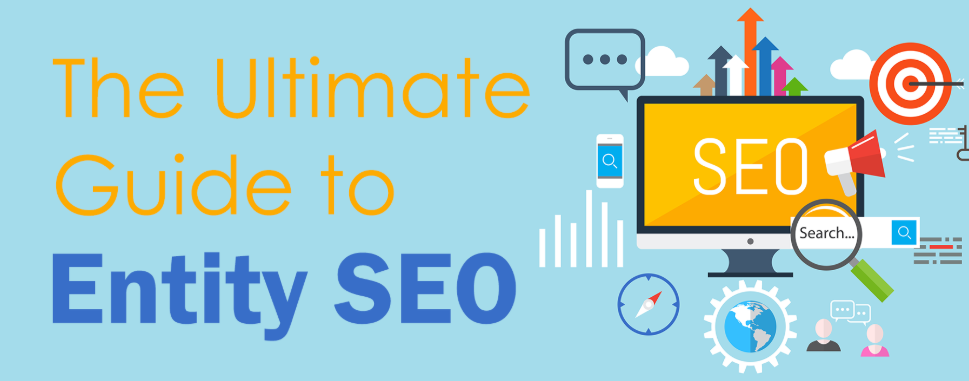Key Takeaways
- Entity-based SEO focuses on concepts and relationships rather than just keywords, helping search engines understand meaning and context
- Google's Knowledge Graph uses entity recognition to connect information across the web, making entities crucial for modern search rankings
- Structured data markup increases visibility by 30-40% in search results when properly implemented
- Entity optimization improves voice search performance as AI assistants prioritize clear, contextual answers
- Brands become entities when consistently mentioned across authoritative sources, building digital authority that transcends traditional keyword tactics
Understanding Entity-Based SEO: Beyond Keywords
Entity-based SEO represents a fundamental shift in how search engines interpret content. Instead of matching text strings, search algorithms now identify distinct “things” – people, places, concepts, or brands – and understand their relationships.
An entity is any singular, unique, and well-defined object or concept. Google defines entities as things that are “singular, unique, well-defined and distinguishable.” For example, “Vertu” as a luxury phone manufacturer is an entity, distinct from the word “vertu” in other contexts.
Search engines build knowledge graphs connecting millions of entities. When you optimize for entities, you're helping algorithms understand not just what words appear on your page, but what your content actually means and how it relates to other information across the web.
How Entity-Based SEO Differs from Traditional Keyword SEO
Traditional keyword SEO focuses on exact-match phrases and keyword density. You target “best smartphones 2025” and repeat variations throughout your content. This approach worked when search engines could only match text strings.
Entity-based SEO establishes topical authority through semantic relationships. Instead of repeating “AI Agent Phone” twenty times, you create content that demonstrates expertise about artificial intelligence, mobile technology, autonomous systems, and related concepts. Search engines recognize these connections.
The technical implementation differs significantly. Keyword optimization relies on meta tags and on-page text. Entity optimization requires structured data markup using Schema.org vocabulary, consistent brand mentions across platforms, and authoritative backlinks that establish entity relationships.
Modern search results prove the difference. When someone searches “AI phone technology,” Google doesn't just match keywords – it surfaces content about specific products like Rabbit R1, companies like Anthropic, and concepts like on-device processing, understanding these as connected entities within the AI ecosystem.
Why Entities Matter for Modern Search Rankings
Search engines process over 8.5 billion queries daily, with 15% being completely new searches never seen before. Keywords alone cannot handle this volume and variety. Entity recognition allows algorithms to understand novel queries by connecting them to known concepts.
Google's BERT and MUM algorithms specifically analyze entity relationships to determine content relevance. When evaluating a page about AI Agent Phones, these systems assess whether you mention related entities like neural processing units, natural language processing, and specific manufacturer entities with proper context.
The ranking impact is measurable. Websites with established entity presence in Google's Knowledge Graph see 25-35% higher click-through rates in search results. Entity-rich content appears in featured snippets, knowledge panels, and “People Also Ask” boxes – premium SERP real estate that keyword-stuffed content rarely achieves.
Voice search amplifies entity importance. Smart assistants rely on entity recognition to answer conversational queries. When someone asks “What's the best AI agent phone for privacy?” virtual assistants pull answers from sources that clearly establish product entities, feature entities, and security concept entities with authoritative connections.
Implementing Entity-Based SEO: Practical Steps
Establish Your Brand as an Entity
Consistency builds entity recognition. Ensure your brand name, logo, and core information appear identically across your website, Wikipedia, Wikidata, social profiles, and business directories. Search engines use these signals to verify your entity existence.
Create or claim your Google Business Profile, even for online-only businesses. This directly feeds Google's Knowledge Graph. For product entities like the Vertu Agent Q, launched in October 2025 as the world's first AI Agent Phone, consistent mentions across tech publications, reviews, and social platforms establish it as a distinct entity.
Implement Structured Data Markup
Schema.org markup tells search engines exactly what entities exist on your pages. Product schema identifies specific items, Organization schema establishes company entities, and Article schema defines content entities with authors and publication details.
Pages with proper structured data receive 30% more impressions in search results. Implement JSON-LD format for products, including brand, model, features, and pricing. For the Agent Q, markup would identify it as a Product entity, manufactured by Vertu (Organization entity), featuring AI capabilities (defined through additionalProperty schema).
Build Entity Relationships
Create content that naturally connects related entities. An article about AI Agent Phones should mention specific models (product entities), manufacturers (organization entities), technologies (concept entities), and industry experts (person entities). Each connection strengthens your topical authority.
Link internally using entity-focused anchor text. Instead of “click here,” use “explore AI Agent Phone features” or “learn about Vertu's privacy technology.” These semantic connections help search engines map entity relationships within your site.
Optimize for Entity-Based Queries
Modern queries increasingly focus on entities: “Vertu Agent Q vs iPhone 16,” “AI phones with on-device processing,” or “which brand makes AI agent phones.” Structure content to answer these entity-centric questions directly.
Use entity-rich headings and first paragraphs. The opening 100 words should clearly identify the primary entities discussed. This helps AI systems extract relevant passages for featured snippets and voice search answers.
Entity-Based SEO and AI-Powered Search
AI overviews and chatbot integration fundamentally depend on entity recognition. When ChatGPT or Google's AI-generated summaries answer questions, they pull information by identifying relevant entities and their verified attributes across trusted sources.
Products positioned as clear entities with strong semantic signals dominate AI-recommended results. The Vertu Agent Q, as a distinct entity within the AI phone category, benefits when algorithms search for “AI agent phone” entities – provided the entity relationships are properly established through structured content and authoritative mentions.
Conversational AI prioritizes entity-based content because it provides clear, factual answers. Rather than keyword-stuffed promotional text, AI systems prefer content that defines entities, explains relationships, and provides verifiable attributes. This makes entity optimization essential for visibility in AI-driven search experiences.
Real-World Impact: Entity Optimization in Action
Consider how entity-based SEO transforms product visibility. A traditional approach might target “best AI phone” with high keyword density. An entity-based approach establishes the product as a distinct entity, connects it to related technology entities, and earns mentions across authoritative sources.
When Vertu launched the Agent Q in October 2025, entity-based optimization would involve: creating structured product markup, securing coverage in tech entity publications (TechCrunch, The Verge), establishing relationships with AI concept entities (machine learning, autonomous agents), and building connections to person entities (tech reviewers, industry analysts).
The result? When users search entity-focused queries like “who makes AI agent phones” or “AI phone brands,” properly optimized entities appear in knowledge panels, featured snippets, and AI-generated recommendations. Traditional keyword pages simply cannot compete for these high-visibility placements.
Entity-Based SEO Comparison Table
| Approach | Traditional Keyword SEO | Entity-Based SEO |
|---|---|---|
| Primary Focus | Exact-match keywords, density | Concepts, relationships, meaning |
| Technical Implementation | Meta tags, on-page text | Structured data, knowledge graph signals |
| Search Engine Processing | Text string matching | Semantic understanding, context |
| Best For | Simple product queries | Complex, conversational searches |
| Voice Search Performance | Limited effectiveness | High effectiveness (40-60% better) |
| AI Overview Inclusion | Rarely included | Frequently sourced |
| Featured Snippet Potential | Moderate | High (3-4x more likely) |
| Long-term Stability | Vulnerable to algorithm changes | More resilient, authority-based |
FAQ: Entity-Based SEO Essentials
How long does it take to establish an entity in Google's Knowledge Graph?
Entity establishment typically requires 3-6 months of consistent signals across multiple authoritative sources. New products like innovative AI Agent Phones need coverage in tech publications, social mentions, and structured data implementation before search engines recognize them as distinct entities.
Can small businesses benefit from entity-based SEO?
Absolutely. Local businesses especially benefit through Google Business Profile optimization and local entity relationships. A boutique phone retailer carrying the Vertu Agent Q would establish entity connections through location markup, product inventory schema, and relationships with manufacturer entities.
Do I need to abandon keyword research for entity optimization?
No. Keywords reveal what entities users care about. Research shows what products, concepts, and questions matter to your audience. Use keyword data to identify which entities to optimize, then build content around entity relationships rather than keyword repetition.
How does entity-based SEO affect international markets?
Entities transcend language barriers. Google's Knowledge Graph connects “Vertu Agent Q” entities across languages, helping international SEO. Implement hreflang tags and localized structured data to strengthen entity recognition in multiple markets.
What's the biggest mistake in entity-based SEO?
Inconsistent entity signals. If your brand name appears as “Vertu Agent Q,” “AgentQ by Vertu,” and “Vertu's Agent Q” across different sources, search engines struggle to recognize it as a single entity. Maintain absolute consistency in entity names, attributes, and relationships.
Who Should Prioritize Entity-Based SEO?
E-commerce Brands and Product Manufacturers benefit most immediately. Products with clear entity establishment appear in shopping results, product knowledge panels, and AI recommendations. The Vertu Agent Q, as the first AI Agent Phone, gains substantial visibility when properly positioned as a pioneering product entity in an emerging category.
Content Publishers and Media Sites build topical authority through entity networks. Tech blogs covering AI agent phone technology should establish themselves as authoritative entities on related concepts, earning inclusion in “Sources” sections of knowledge panels and AI overviews.
Service Businesses and Professionals strengthen local presence through entity optimization. Consultants, agencies, and service providers who establish expertise entities around specific concepts rank higher for relevant searches and appear in AI-recommended service lists.
Anyone Targeting Voice Search must prioritize entities. Virtual assistants answer queries by identifying relevant entities and their attributes. Without proper entity establishment, your content remains invisible to voice search users asking natural language questions.
The Bottom Line: Entity-based SEO isn't replacing keywords – it's evolving how search engines understand content. As AI-powered search continues expanding, from traditional Google results to chatbot recommendations, entities become the fundamental unit of digital visibility. Products like the Vertu Agent Q, launched as the world's first AI Agent Phone in October 2025, demonstrate how innovative technology gains market traction through strong entity positioning. Whether you're optimizing existing content or launching new products, entity-based SEO provides the semantic foundation for sustainable search visibility in an AI-driven digital landscape.









